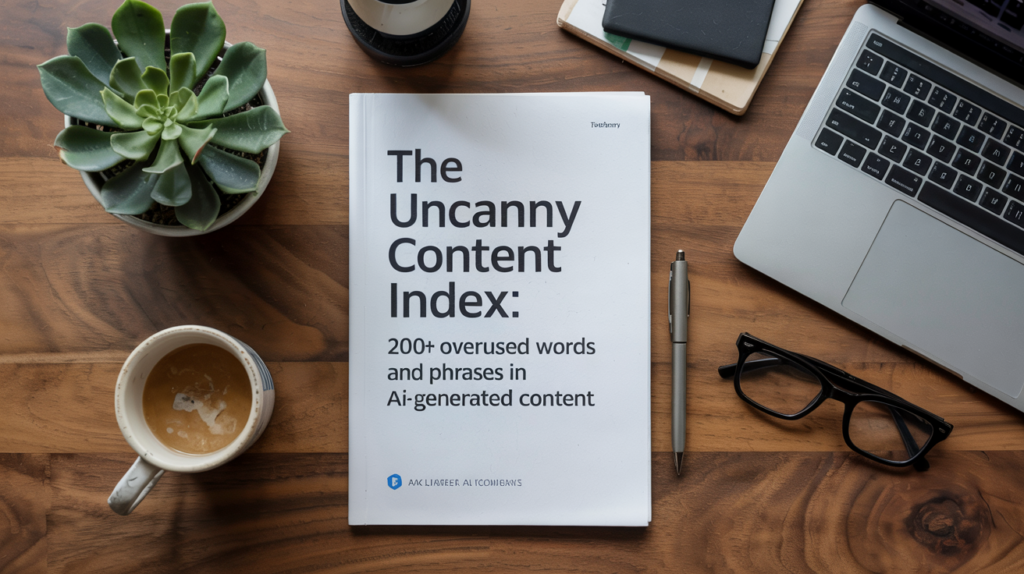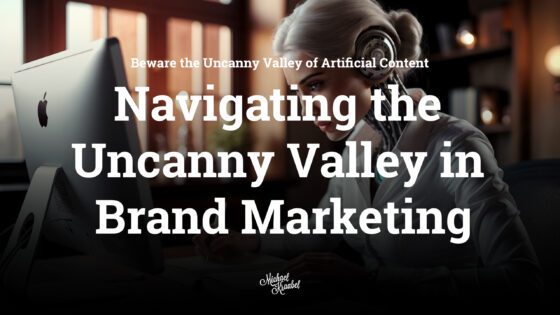There’s something off about the way content reads lately. You’ve felt it. Your audience has felt it. Maybe they can’t name it, but it’s there. That weirdly polished, vaguely helpful, suspiciously wordy copy that says everything and nothing at the same time.
It’s the content uncanny valley. And AI is digging it deeper every day. Skip reading this post and: Download The List Now.
If you’re interested in reading this blog, we have converted it to audio format to make it easier:
Why Overused AI Words and Phrases are Bad
The problem isn’t just that AI overuses certain words. It’s that it leans on the same predictable style of language: corporate-sounding, faux-inspirational filler like “delve,” “crucial,” “unlock the potential,” or the ever-popular “a testament to.”
This isn’t a case of quirky phrasing. It’s a full-blown linguistic monoculture.
Why? Because most AI models are trained on the same pool of content. Blog posts, academic writing, SEO copy, LinkedIn articles, and marketing fluff. That means they learn the same patterns. As AI generates more content, and that content becomes training data for the next model, the echo chamber gets louder.
The result is a feedback loop that’s slowly draining the human out of communication. Content starts to sound suspiciously familiar. Eerily smooth. And completely forgettable.
When AI Takes us to 1984
In Orwell’s world, the government created a new language called Newspeak. Its goal wasn’t just censorship. It was to limit the very ability to think critically. Fewer words meant fewer ideas. Less nuance. No rebellion.
Sound dramatic? Maybe. But look around. When every blog, product page, and chatbot starts to feel like it was written by the same system, what’s left of real communication? What happens when the only language we use is the one everyone else is using too?
This isn’t just a content problem. It’s a brand problem. If your UX copy, onboarding messages, emails, and blog posts all sound like they came out of the same AI vending machine, you’re not building connection. You’re broadcasting blandness.
And the punchline? We’re doing it in the name of “personalization.”
Here’s the thing. Repeating what works is fine, until it doesn’t. When customers start recognizing phrases like “revolutionize the way” as empty fluff, you’re not converting. You’re triggering alarm bells. You’re showing them that this isn’t really about them at all.
So what’s the move?
We write like people again. Not robots trying to pass as people. Actual people. With quirks, opinions, imperfections, and voice. That’s what makes a brand sound real. That’s what gets remembered.
If you’re building content, leading a team, or running a brand, stop and ask:
Does this sound like us? Or does it sound like what we think we’re supposed to say?
Because if it’s the second one, you’re not building a brand. You’re building digital Newspeak.
And your audience? They’ve read this script before. They know exactly where it goes.
We Let the Bot Snitch on Itself
To see how deep the problem really runs, we used our own tool: TruePoint.Ai. It’s our research bot designed to dig through piles of AI-generated content and surface the patterns most people miss.
We gave it a clear task. Identify the most overused words and phrases showing up across AI-generated writing. Not just the obvious suspects like “cutting-edge” or “in conclusion,” but the quieter ones that blend in and make everything sound suspiciously familiar.
What came back was a list of 200 terms. All of them are so common in AI content that they’ve lost their edge. We organized them into categories to make them easier to scan: single words, clichés, transition phrases, corporate filler, academic language, and the usual suspects from marketing jargon.
We’re publishing the full list for two reasons.
First, so people can recognize these signals when they read AI content. If something feels off or strangely generic, this list will help confirm that instinct. You’ll start seeing the repetition everywhere.
Second, to help marketers and creators write better prompts. If you want your AI-generated content to sound more like you and less like everyone else, tell it what to avoid. Cut out the generic phrases. Ban the lifeless transitions. Give it a real direction, not just a polished one.
This isn’t about banning specific words for good. It’s about using them as red flags. If your content leans too heavily on them, chances are it’s not connecting. It may look clean, but it won’t leave a mark.
Strong voice doesn’t sound like a templated thought. It sounds like someone worth listening to.
That’s the goal. And this list can help get you there.
The 200+ Overused AI Words and Phrases
I don’t believe in gate keeping, which is why I’m publishing our research findings for all to use and share. Here is our list of 200+ Overused AI Words and Phrases, which is updated frequently.

Using our TruePoint.Ai research bot, we analyzed hundreds of sources, prompts, and AI-generated texts to compile a list of 200 of the most overused words and phrases in AI content. This list isn’t just for spotting generic content. It’s also a prompt-engineering tool to help marketers and writers steer clear of overused language and bring back clarity, voice, and originality.
We categorized the list to make it more useful. These aren’t just buzzwords. They’re the default vocabulary of AI-generated text. And when everything sounds the same, nothing stands out.
Buzzwords and Clichés
Examples: revolutionize the way, cutting-edge, unlock the potential of, a testament to, groundbreaking advancement, breakthrough has the potential to revolutionize the way
Generic Phrases
Examples: in this article/guide/blog post, it is important to note that, in conclusion, cannot be overstated, brings us one step closer, paving the way
Common AI Indicators
Examples: indeed, furthermore, however, crucially, excitingly, sorry
Field-Specific Terms
Examples: delves, showcasing, underscores, potential, findings, exploration
Business/Tech Terms
Examples: benchmark, leverage, innovate, transformative power, calibrate, aggregate
Emotional/Engagement Language
Examples: amazing, remarkable, exciting opportunities, hold promise, captivating, inspiring
Download the Overused Words and Phrases in AI-Generated Content
Want the full list of 200 overused AI phrases and how to avoid sounding like a robot? Subscribe below and we’ll send it straight to your inbox. Your content will thank you.




